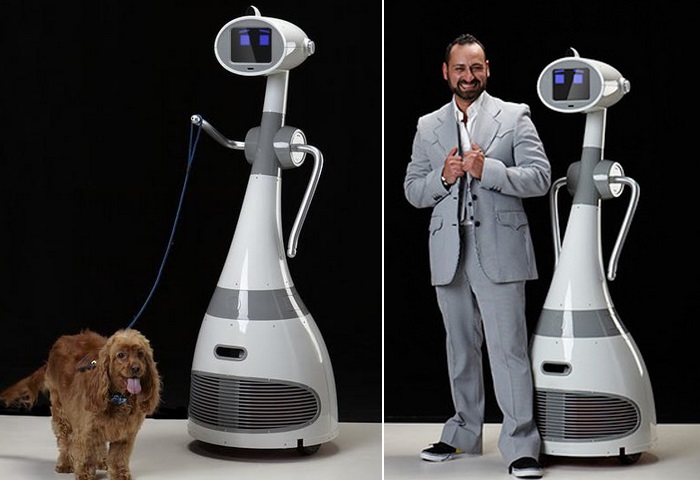In 2011, Gizmag and other publications noted the “mysterious debut” of Luna, a home-service robot then retailing for $3,000 in a small batch. Recently, her creators have brought Luna back into the spotlight with a new Kickstarter campaign, and have dropped the bot’s price in keeping with their belief that “every home deserves a personal robot.”
Developed by RoboDynamics and design studio SchultzeWORKS, Luna is 5 feet tall, weighs 60 pounds, can navigate flat surfaces on her own (like similarly sized follow-bots), and has position-able metal arms. She’s also equipped with a capacitive touchscreen and a hi-def camera, among other features, but RoboDynamics CEO Fred Nikgohar stresses that her simple design is meant to enable owners and developers to customize Luna and create any number of new uses for her.
“She is a powerful platform capable of an increasing universe of apps and services through an app store model,” Nikgohar explained. Luna bots will be sporting Mini-ITX motherboards, dual core X86 CPUs, 8GB of RAM, 16GB SSD in storage, and 802.11n WiFi connectivity, and is compatible with any number of off-the-shelf upgrades and add-ons. Since her software consists of Linux Ubuntu and ROS (the “de facto OS” for robotics), Luna will be an open-source tool for owners and robotics enthusiasts alike. Nikgohar continued,
We specifically designed her to be a multi-purpose platform, highly affordable, and highly flexible. It is easy to [operate, upgrade, and program her.] It is easy to add third-party accessories […] and we provide hardware/software development tools for [users] to do so. In short, we believe Luna is the iPhone of robots, in that for the first time it provides a platform where an ecosystem can finally emerge from a cohesive vision of what robots should be, do, and look like.
He added, “In fact, our Kickstarter campaign is geared towards developers/entrepreneurs who want to create apps and services — and ultimately businesses — in robotics.”
With a background and interest in “robotic telepresence,” Nikgohar and his team initially intended for Luna (among other things) to provide health, security, and all-purpose surveillance and supervision where and when human presence was unavailable. Earlier in the company’s history, he explained, the company’s telepresence system (called TiLR) “was a $30-$50k solution that we were selling to large enterprises and institutions.”
In designing Luna, the team hoped to provide a more affordable and consumer-targeted version of this service. In pursuit of this goal, Nikgohar launched Luna in 2011 “mainly to start a conversation” about his team’s work and to receive customer feedback, and has spent the interim carefully refining Luna, equipping her with more features, bringing her manufacturing costs down, and connecting with app designers for her platform, he explained.
In her new iteration, Luna will retail for $1,500 (half the price of her 2011 model), but can be pre-ordered via the team’s Kickstarter for $999. In addition to gaining a person-scaled home robot and accompanying developer support kits, purchasers will be contributing to what Nikgohar sees as a long-overdue renaissance in open-source, multi-purpose robots. He noted, “If you look at the trajectory of other parallel technologies, we can see that PCs, mobiles, tablets, mainframes, etc… have all prospered, while consumer robotics has been a huge and disappointing laggard.” Rather than more of the “one-off,” single-purpose robots that have dominated robotics of late, Nikgohar explained, he’d like to see a wave of user- and developer-led, highly capable robots and apps fill the marketplace. He continued,
Since our founding, our mission [has been] to bring robots to the masses. We believe that robots and humans can live and work in harmony together. Luna is the first evolutionary step in a near-future where robots become a normal part of everyday human life.
According to robotics experts and other developers, he may be right that human-robot relations will soon get a lot more intimate and commonplace.
